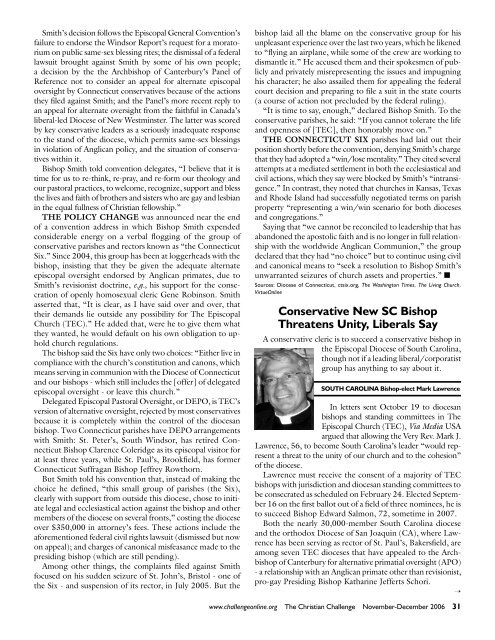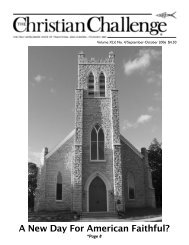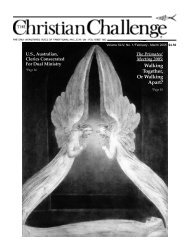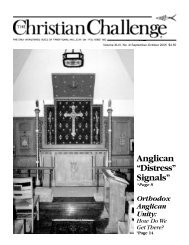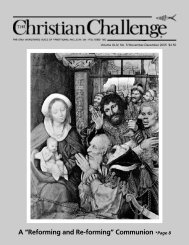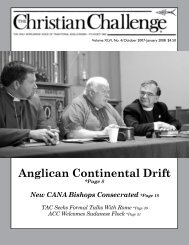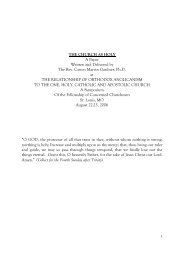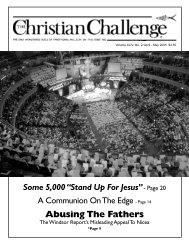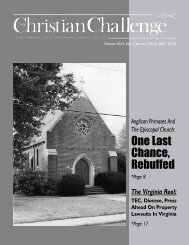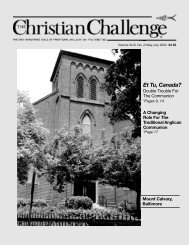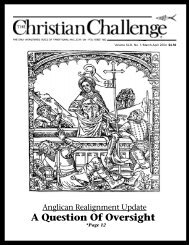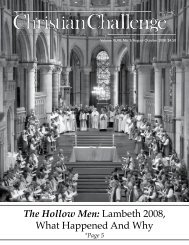Church Planting For The 21st Century - The Christian Challenge
Church Planting For The 21st Century - The Christian Challenge
Church Planting For The 21st Century - The Christian Challenge
Create successful ePaper yourself
Turn your PDF publications into a flip-book with our unique Google optimized e-Paper software.
Smith’s decision follows the Episcopal General Convention’s<br />
failure to endorse the Windsor Report’s request for a moratorium<br />
on public same-sex blessing rites; the dismissal of a federal<br />
lawsuit brought against Smith by some of his own people;<br />
a decision by the the Archbishop of Canterbury’s Panel of<br />
Reference not to consider an appeal for alternate episcopal<br />
oversight by Connecticut conservatives because of the actions<br />
they filed against Smith; and the Panel’s more recent reply to<br />
an appeal for alternate oversight from the faithful in Canada’s<br />
liberal-led Diocese of New Westminster. <strong>The</strong> latter was scored<br />
by key conservative leaders as a seriously inadequate response<br />
to the stand of the diocese, which permits same-sex blessings<br />
in violation of Anglican policy, and the situation of conservatives<br />
within it.<br />
Bishop Smith told convention delegates, “I believe that it is<br />
time for us to re-think, re-pray, and re-form our theology and<br />
our pastoral practices, to welcome, recognize, support and bless<br />
the lives and faith of brothers and sisters who are gay and lesbian<br />
in the equal fullness of <strong>Christian</strong> fellowship.”<br />
THE POLICY CHANGE was announced near the end<br />
of a convention address in which Bishop Smith expended<br />
considerable energy on a verbal flogging of the group of<br />
conservative parishes and rectors known as “the Connecticut<br />
Six.” Since 2004, this group has been at loggerheads with the<br />
bishop, insisting that they be given the adequate alternate<br />
episcopal oversight endorsed by Anglican primates, due to<br />
Smith’s revisionist doctrine, e.g., his support for the consecration<br />
of openly homosexual cleric Gene Robinson. Smith<br />
asserted that, “It is clear, as I have said over and over, that<br />
their demands lie outside any possibility for <strong>The</strong> Episcopal<br />
<strong>Church</strong> (TEC).” He added that, were he to give them what<br />
they wanted, he would default on his own obligation to uphold<br />
church regulations.<br />
<strong>The</strong> bishop said the Six have only two choices: “Either live in<br />
compliance with the church’s constitution and canons, which<br />
means serving in communion with the Diocese of Connecticut<br />
and our bishops - which still includes the [offer] of delegated<br />
episcopal oversight - or leave this church.”<br />
Delegated Episcopal Pastoral Oversight, or DEPO, is TEC’s<br />
version of alternative oversight, rejected by most conservatives<br />
because it is completely within the control of the diocesan<br />
bishop. Two Connecticut parishes have DEPO arrangements<br />
with Smith: St. Peter’s, South Windsor, has retired Connecticut<br />
Bishop Clarence Coleridge as its episcopal visitor for<br />
at least three years, while St. Paul’s, Brookfield, has former<br />
Connecticut Suffragan Bishop Jeffrey Rowthorn.<br />
But Smith told his convention that, instead of making the<br />
choice he defined, “this small group of parishes (the Six),<br />
clearly with support from outside this diocese, chose to initiate<br />
legal and ecclesiastical action against the bishop and other<br />
members of the diocese on several fronts,” costing the diocese<br />
over $350,000 in attorney’s fees. <strong>The</strong>se actions include the<br />
aforementioned federal civil rights lawsuit (dismissed but now<br />
on appeal); and charges of canonical misfeasance made to the<br />
presiding bishop (which are still pending).<br />
Among other things, the complaints filed against Smith<br />
focused on his sudden seizure of St. John’s, Bristol - one of<br />
the Six - and suspension of its rector, in July 2005. But the<br />
bishop laid all the blame on the conservative group for his<br />
unpleasant experience over the last two years, which he likened<br />
to “flying an airplane, while some of the crew are working to<br />
dismantle it.” He accused them and their spokesmen of publicly<br />
and privately misrepresenting the issues and impugning<br />
his character; he also assailed them for appealing the federal<br />
court decision and preparing to file a suit in the state courts<br />
(a course of action not precluded by the federal ruling).<br />
“It is time to say, enough,” declared Bishop Smith. To the<br />
conservative parishes, he said: “If you cannot tolerate the life<br />
and openness of [TEC], then honorably move on.”<br />
THE CONNECTICUT SIX parishes had laid out their<br />
position shortly before the convention, denying Smith’s charge<br />
that they had adopted a “win/lose mentality.” <strong>The</strong>y cited several<br />
attempts at a mediated settlement in both the ecclesiastical and<br />
civil actions, which they say were blocked by Smith’s “intransigence.”<br />
In contrast, they noted that churches in kansas, Texas<br />
and Rhode Island had successfully negotiated terms on parish<br />
property “representing a win/win scenario for both dioceses<br />
and congregations.”<br />
Saying that “we cannot be reconciled to leadership that has<br />
abandoned the apostolic faith and is no longer in full relationship<br />
with the worldwide Anglican Communion,” the group<br />
declared that they had “no choice” but to continue using civil<br />
and canonical means to “seek a resolution to Bishop Smith’s<br />
unwarranted seizures of church assets and properties.” n<br />
Sources: Diocese of Connecticut, ctsix.org, <strong>The</strong> Washington Times, <strong>The</strong> Living <strong>Church</strong>,<br />
VirtueOnline<br />
Conservative New SC Bishop<br />
Threatens Unity, Liberals Say<br />
A conservative cleric is to succeed a conservative bishop in<br />
the Episcopal Diocese of South Carolina,<br />
though not if a leading liberal/corporatist<br />
group has anything to say about it.<br />
SOUTH CAROLINA Bishop-elect Mark Lawrence<br />
In letters sent October 19 to diocesan<br />
bishops and standing committees in <strong>The</strong><br />
Episcopal <strong>Church</strong> (TEC), Via Media USA<br />
argued that allowing the Very Rev. Mark J.<br />
Lawrence, 56, to become South Carolina’s leader “would represent<br />
a threat to the unity of our church and to the cohesion”<br />
of the diocese.<br />
Lawrence must receive the consent of a majority of TEC<br />
bishops with jurisdiction and diocesan standing committees to<br />
be consecrated as scheduled on February 24. Elected September<br />
16 on the first ballot out of a field of three nominees, he is<br />
to succeed Bishop Edward Salmon, 72, sometime in 2007.<br />
Both the nearly 30,000-member South Carolina diocese<br />
and the orthodox Diocese of San Joaquin (CA), where Lawrence<br />
has been serving as rector of St. Paul’s, Bakersfield, are<br />
among seven TEC dioceses that have appealed to the Archbishop<br />
of Canterbury for alternative primatial oversight (APO)<br />
- a relationship with an Anglican primate other than revisionist,<br />
pro-gay Presiding Bishop katharine Jefferts Schori.<br />
→<br />
www.challengeonline.org <strong>The</strong> <strong>Christian</strong> <strong>Challenge</strong> November-December 2006 1


